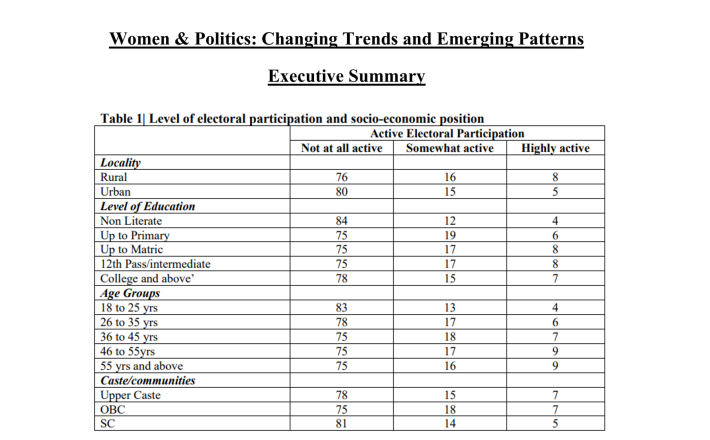Women & Politics: Changing trends and emerging patterns executive summary
This collaborative report between, Lokniti a programme of the Centre for the Study of Developing Societies and Konrad Adenauer Stiftung has attempted to look at women and politics from a multi-track perspective. While the assessment relied quite extensively on existing aggregate data on the theme and an exhaustive review of literature, the key focus of the analysis was the findings of a survey conducted among women across the country. The report is divided into eight chapters including the conclusion and the introduction and relies heavily on Lokniti’s survey data. Having chosen a sample of respondents that helped best mirror the larger `universe` it was meant to represent (Indian women), a range of questions on the patterns of political participation and representation were asked. The survey attempted to assess the perception of women to different dimensions of political participation and representation and the challenges in this regard. The survey findings have helped present the socio-economic and cultural context that define and decide the attitudes and perception of women to issues of political participation and representation. The varied factors that contribute to greater women’s participation in politics and the pathways to greater political representation were also assessed as part of the study. The study examines the perceptions of women to their role as voters. Their views on different dimensions of political participation and the barriers to the same are also studied. The impact of political socialization and the family are also analysed as part of the survey. Factors that influence voting decisions as well as womens’ perception of women as leaders, has also been attempted in this study.
Click here to see the academic article.

This collaborative report between, Lokniti a programme of the Centre for the Study of Developing Societies and Konrad Adenauer Stiftung has attempted to look at women and politics from a multi-track perspective. While the assessment relied quite extensively on existing aggregate data on the theme and an exhaustive review of literature, the key focus of the analysis was the findings of a survey conducted among women across the country. The report is divided into eight chapters including the conclusion and the introduction and relies heavily on Lokniti’s survey data. Having chosen a sample of respondents that helped best mirror the larger `universe` it was meant to represent (Indian women), a range of questions on the patterns of political participation and representation were asked. The survey attempted to assess the perception of women to different dimensions of political participation and representation and the challenges in this regard. The survey findings have helped present the socio-economic and cultural context that define and decide the attitudes and perception of women to issues of political participation and representation. The varied factors that contribute to greater women’s participation in politics and the pathways to greater political representation were also assessed as part of the study. The study examines the perceptions of women to their role as voters. Their views on different dimensions of political participation and the barriers to the same are also studied. The impact of political socialization and the family are also analysed as part of the survey. Factors that influence voting decisions as well as womens’ perception of women as leaders, has also been attempted in this study.
Click here to see the academic article.